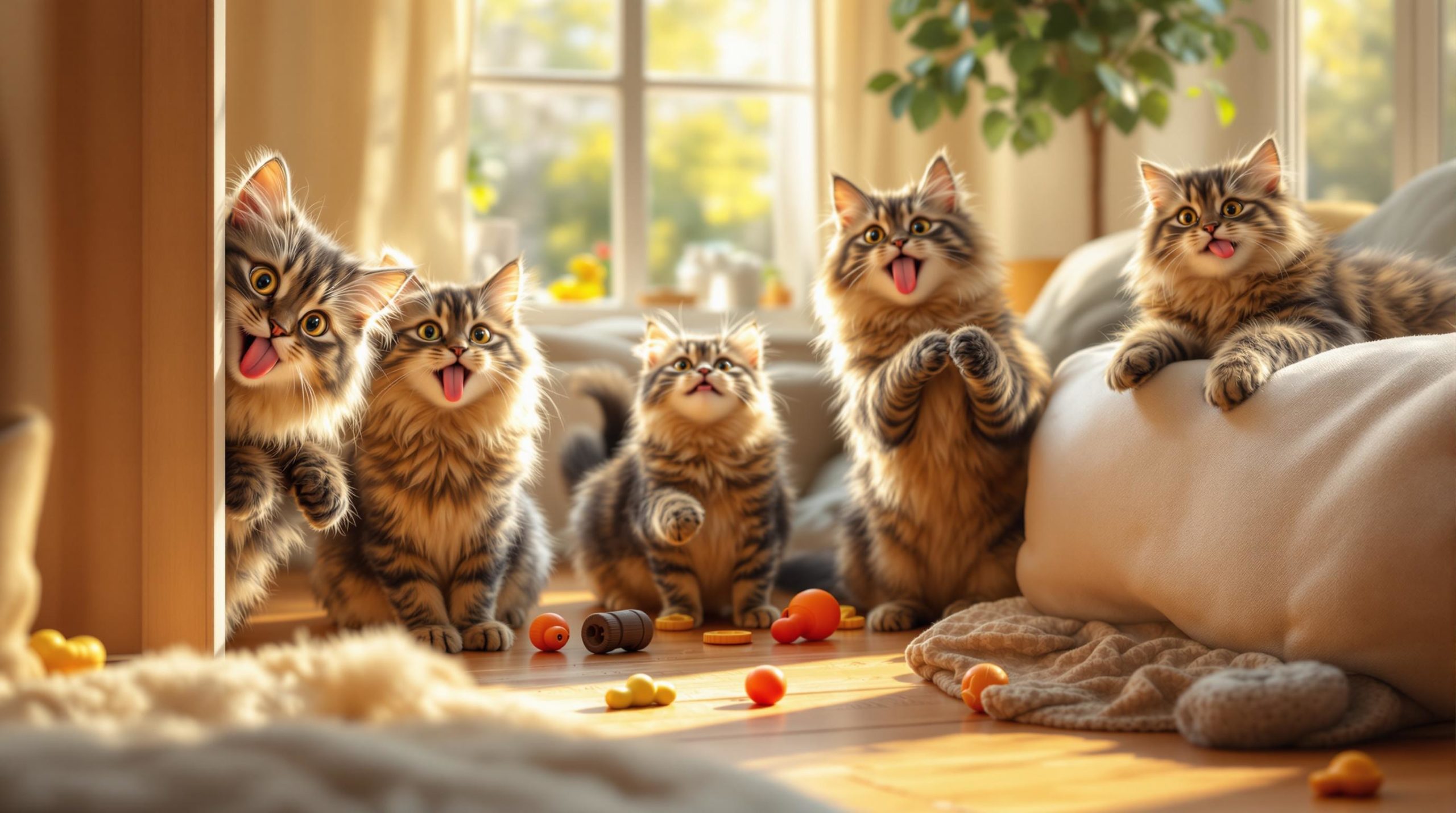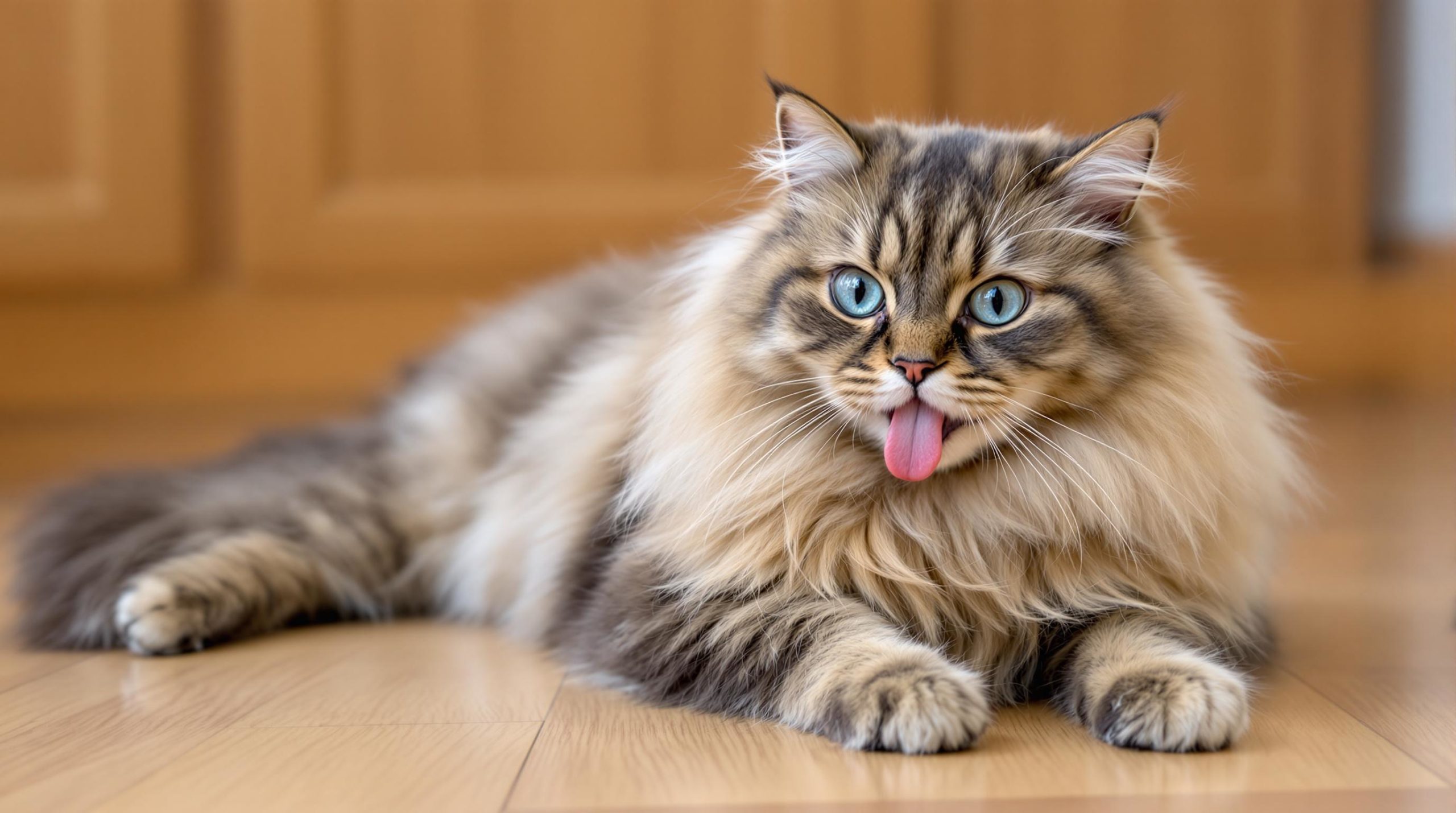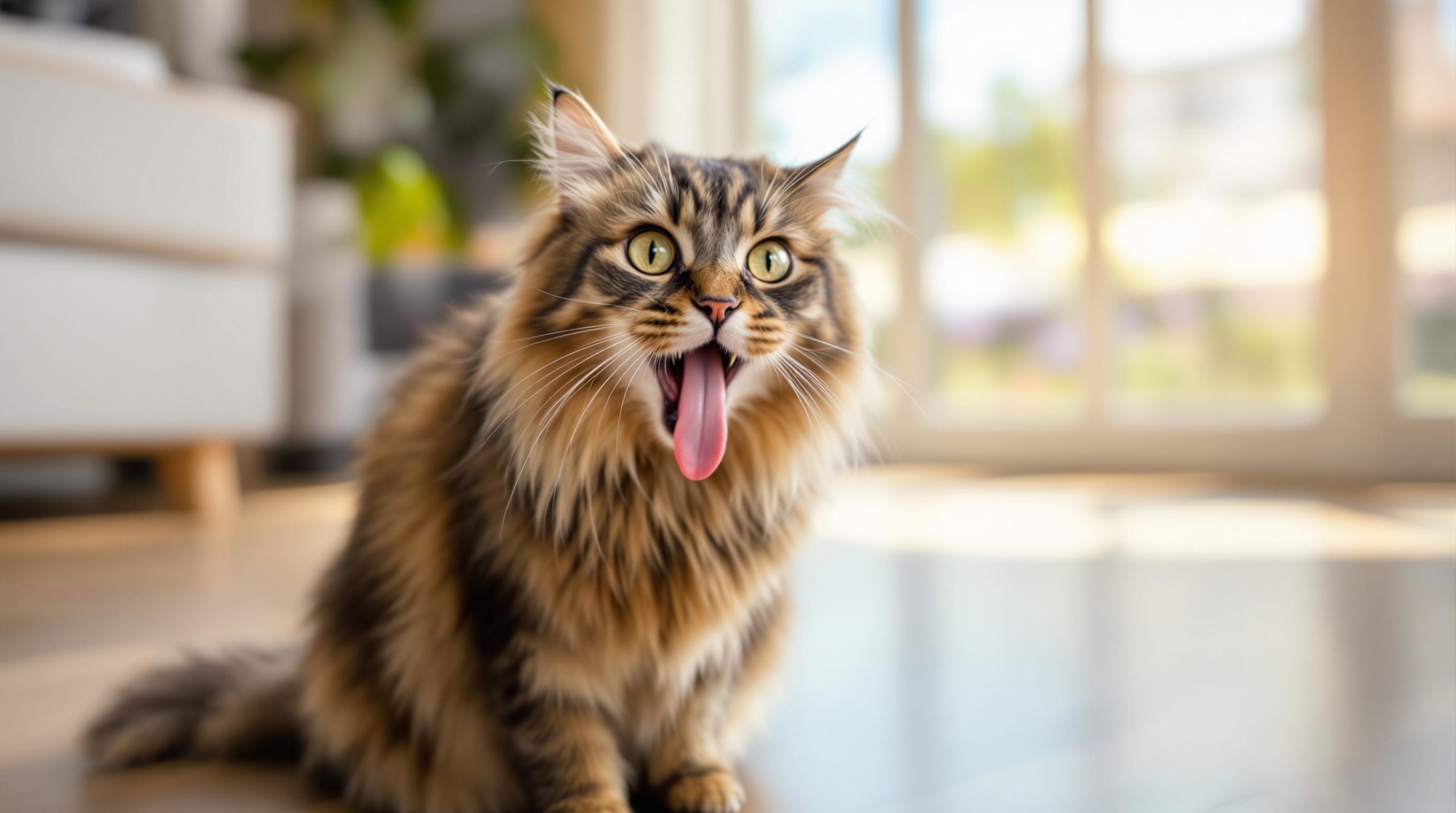discovering the curious habit of Maine Coons sticking their tongues out: 17 intriguing reasons

It’s a sight that instantly captures the hearts of cat lovers everywhere: a majestic Maine Coon, pride of the feline world, sitting or snoozing contentedly with its tongue poking out just a little. This quirky feline habit—often called a “blep”—is more than just a cute quirk. It’s an intriguing window into the complex behavior and health of these curious cats. Far from random, sticking their tongues out can signal relaxation, communication, or sometimes a need for health attention. For pet enthusiasts and those enchanted by animal behavior, understanding why Maine Coons stick their tongues out can deepen appreciation and improve care for these gentle giants. Here’s a deep dive into 17 captivating reasons behind this charming habit.
Why Maine Coons Stick Their Tongues Out: The Relaxation Factor Explored
Maine Coons are renowned for their laid-back personalities, which often play out in adorable behaviors like sticking their tongues out. One of the most common and innocent reasons for this habit is that the cat is simply relaxed.
When the jaw muscles loosen, usually during naps or quiet moments, the tongue naturally slips forward. This is a harmless phenomenon reflecting the deep calm Maine Coons can achieve. Unlike many smaller breeds, their large jaw and broad head make even a slight tongue protrusion quite noticeable.
The Signs of Contentment in Tongue Blepping
You might notice your Maine Coon engaging in this habit during these times:
- Just after grooming, when the cat pauses mid-lick and forgets to retract its tongue.
- When settling down for a nap or stretching luxuriously.
- In moments of intense concentration like watching birds from a window.
Such “tongue lag” is usually fleeting and a delightful quirk that signals comfort and security.
Relaxation vs. Concern: When Tongue Sticking Is Normal
To tell whether the tongue out is just relaxation or cause for worry, consider the context:
- Normal: The tongue slides out briefly, with no other unusual symptoms.
- Warning signs: Persistent tongue protrusion accompanied by drooling, difficulty eating, or foul breath.
For example, a Maine Coon resting after playtime with a momentary “blep” is usually nothing. But if your cat’s tongue often stays out and looks uncomfortable, it may be time to consult a vet.
| Relaxation Signs | When to Worry |
|---|---|
| Brief tongue exposure | Constant tongue protrusion |
| Bowls of water nearby, normal appetite | Reluctance to eat or drink |
| Calm behavior, relaxed posture | Excessive drooling or pawing at mouth |
| Occasional blep after grooming | Signs of mouth pain or bad breath |
Recognizing these signs helps cat lovers care more effectively for their Maine Coons and strengthens the special bond shared through understanding feline habits.

Dental Health and Mouth Issues: A Closer Look at Tongue Out Behavior
While relaxation accounts for many blepping behaviors, dental problems are a significant factor pet enthusiasts must consider. Cats are masters at masking pain, but sticking the tongue out frequently can be a subtle red flag.
Common Dental Problems That Cause Tongue Protrusion
Some dental issues that may cause your Maine Coon to leave its tongue hanging include:
- Gingivitis: Inflammation of the gums causes discomfort and reluctance to fully close the mouth.
- Tooth Resorption: A destructive dental condition prevalent in cats that can lead to pain and tongue exposure.
- Cracked or Broken Teeth: Injury or decay can make jaw movements painful.
- Oral Ulcers and Infections: These can cause sensitivity leading your cat to keep its tongue out.
Since Maine Coons have large heads and strong jaws, any oral pain can substantially affect their eating habits and behavior.
Signs That Accompany Dental Issues
- Bad breath (halitosis)
- Excessive salivation
- Pawing or scratching at the mouth area
- Reluctance to eat hard food like dry kibble or chicken (learn more about Maine Coons and their diet)
- Weight loss or changes in grooming habits
Regular dental check-ups are essential for Maine Coons and can prevent severe complications. Pet owners should monitor their companion’s oral health to catch such issues early.
| Dental Problem | Symptoms | Impact on Tongue |
|---|---|---|
| Gingivitis | Redness, swelling, bad breath | Tongue may protrude due to mouth pain |
| Tooth Resorption | Visible lesions, difficulty eating | Frequent tongue blepping to ease discomfort |
| Cracked Teeth | Reluctance to chew, mouth sensitivity | Tongue may hang out involuntarily |
| Oral Ulcers | Pain, bleeding, drooling | Visible tongue protrusion and irritation |
Understanding these links between dental health and tongue behavior is part of providing excellent cat care, especially for a breed prone to various health nuances (read about Maine Coon health concerns).
Overheating and Panting: When a Maine Coon’s Tongue Speaks of Distress
Aside from relaxation and dental health, environmental and physiological factors can also trigger Maine Coons to stick out their tongues.
Though cat owners might not associate panting or tongue exposure with felines as readily as with dogs, it happens—especially with large, heavily furred breeds like the Maine Coon.
Why Overheating Can Lead to Tongue Out Behavior
Maine Coons are lush-coated cats originally bred for cold climates. Their thick fur once served as natural insulation against harsh New England winters. In warmer indoor environments or during seasonal heat waves, these coats can trap heat and cause discomfort.
While cats mostly regulate body temperature by grooming and minimal sweating through paws, excessive heat may prompt open-mouthed breath with a protruding tongue, akin to canine panting.
Identifying Heat Stress in Maine Coons
- Increased frequency and depth of breathing
- Disorientation or lethargy
- Restlessness or seeking cool surfaces
- Salivation or drooling more than usual
- Visible tongue sticking out accompanied by panting
Owners noticing these signs should act promptly to cool their cat down, offering water, shade, and ventilation. Prolonged overheating can escalate to heatstroke, a dangerous condition needing emergency veterinary intervention.
| Symptom | Explanation | Action Needed |
|---|---|---|
| Excessive panting with tongue out | Body attempting to cool down | Move cat to cool area, provide water |
| Lethargy or weakness | Heat affecting normal functioning | Monitor closely; seek vet care if worsens |
| Restlessness | Discomfort with heat | Provide cool surfaces and air circulation |
| Salivation/drooling | Stress or overheating symptom | Seek vet advice if persistent |
Given the complexity of Maine Coon coat and physiology, awareness of heat stress signs forms a vital part of pet behavior knowledge and health management (see how exercise and environment affect health).

The Flehmen Response and Other Fascinating Feline Behaviors Involving Tongue
Maine Coons share many built-in feline behaviors that pet enthusiasts find fascinating, one of the most curious being the Flehmen response. This instinctive reaction involves sticking their tongue out in a peculiar way that serves to “taste the air” and gather information about their environment.
What Is the Flehmen Response?
When your Maine Coon curls back its lips and sticks out its tongue slightly after encountering an unfamiliar or interesting scent (such as another feline’s pheromones), it is engaging in the Flehmen response. This behavior directs scent chemicals toward a specialized organ called the vomeronasal organ or Jacobson’s organ, located on the roof of their mouth.
This allows them to analyze complex chemical signals, playing an important role in communication and territory understanding.
Common Triggers of Flehmen in Maine Coons
- A new animal introduced into your home or yard
- The scent of a potential mate, especially during breeding season
- Curious investigation of unfamiliar foods or objects
- Exploring outdoor scents and pheromone trails
While it can look amusing or strange to see this grimacing tongue-out face, it’s a natural expression of Maine Coons’ inherent curiosity in cats and their sophisticated sensory perception.
| Trigger | Description | Purpose |
|---|---|---|
| Encountering another cat’s scent | Scent deposited in territory or on objects | Gather chemical messages to evaluate presence |
| New food or object | Novelty scents or tastes encountered | Assess suitability or safety |
| Breeding season | Aromones related to potential mates | Communication and reproductive readiness |
| Exploration outdoors | Varied environmental chemical signals | Environmental awareness and mapping |
Neurological, Medication, and Structural Causes Behind Tongue Protrusion in Maine Coons
Though the reasons covered so far explain a majority of tongue-out cases, some less common but critical causes warrant attention from cat care experts and pet lovers alike.
Neurological Factors Affecting Tongue Position
Rarely, Maine Coons may experience neurological disorders that lead to involuntary tongue protrusion. These can include facial nerve damage or mild seizures, which might be accompanied by other symptoms such as head tilts, loss of coordination, or facial asymmetry.
Such conditions require immediate veterinary evaluation to diagnose and begin treatment.
Side Effects of Medication and Sedation
Post-operative sedation or the effects of strong painkillers can temporarily impair a cat’s muscle control. Consequently, a Maine Coon may stick its tongue out involuntarily during recovery. This is usually short-term and resolves as the medications wear off.
Structural and Jaw Abnormalities
Certain dental and jaw issues can predispose Maine Coons to tongue-protrusion habits. These include:
- Overbites or underbites affecting tongue placement
- Missing or extracted teeth creating gaps
- Injuries causing permanent anatomical changes
Usually, cats adapt well to these quirks, but persistent signs may need veterinary assessment to ensure no underlying discomfort or functional issues.
| Cause | Associated Signs | Suggested Action |
|---|---|---|
| Neurological disorders | Head tilting, facial drooping, uncoordinated movement | Immediate veterinary check-up |
| Post-surgical sedation | Temporary reduced muscle control, tongue out | Monitor for improvement, consult vet if prolonged |
| Jaw abnormalities | Visible malocclusion, persistent tongue protrusion | Dental and veterinary evaluation |
Additional Reasons Why Maine Coons May Stick Their Tongues Out
Beyond all the health-related and behavioral causes explored, several other intriguing reasons may explain why these curious cats poke their tongues out.
- Foreign objects stuck in the mouth: Small bits of food, string, or hair can lodge between teeth and irritate the tongue.
- Jealousy and social signaling: Some research suggests subtle social communication cues could be expressed by tongue blepping, reflecting complex feline emotions (discover more about Maine Coon emotions).
- Genetic tendencies: Some Maine Coons may inherit traits that make tongue blepping more frequent.
- Mild respiratory issues: Difficulty breathing might occasionally cause open-mouth breathing with tongue exposure.
- Age-related changes: As Maine Coons grow older, weaker muscle tone or dental losses may increase tongue protrusion episodes (health challenges in aging Maine Coons).
Note that while these reasons are diverse, the overarching theme is that Maine Coons express rich and multifaceted feline habits that charm and puzzle their pet lovers alike.
| Additional Cause | Explanation | When to Consult Vet |
|---|---|---|
| Foreign object irritation | Bits stuck causing discomfort and tongue flicking | If persistent or accompanied by pawing at mouth |
| Jealousy/social signaling | Emotional communication through subtle behaviors | Typically harmless, monitor for stress |
| Genetics | Inherited tongue posture tendencies | No concern if otherwise healthy |
| Respiratory distress | Open mouth breathing due to congestion | If breathing labored or persistent, vet needed |
| Aging-related changes | Muscle tone decline, tooth loss | Regular vet check-ups recommended |
Frequently Asked Questions About Maine Coons Sticking Their Tongues Out
- Q: Is it normal for a Maine Coon to stick its tongue out frequently?
A: Occasional tongue protrusion during relaxation or grooming is normal and harmless. However, frequent or persistent blepping may indicate dental or health issues. - Q: Can sticking their tongue out mean my Maine Coon is sick?
A: Yes, especially if accompanied by drooling, bad breath, or reluctance to eat. A vet visit is advised to rule out oral or respiratory problems. - Q: Should I worry if my Maine Coon pants with its tongue out?
A: Panting is unusual in cats and can signal overheating or respiratory distress. Immediate attention and cooling measures should be taken. - Q: How can I tell if my Maine Coon’s tongue out habit is due to dental pain?
A: Look for signs like bad breath, pawing at the mouth, difficulty eating, or drooling. These alongside tongue exposure warrant a dental check. - Q: Is the Flehmen response dangerous?
A: Not at all. It is a natural, harmless scent-gathering behavior common in all cats, including Maine Coons.